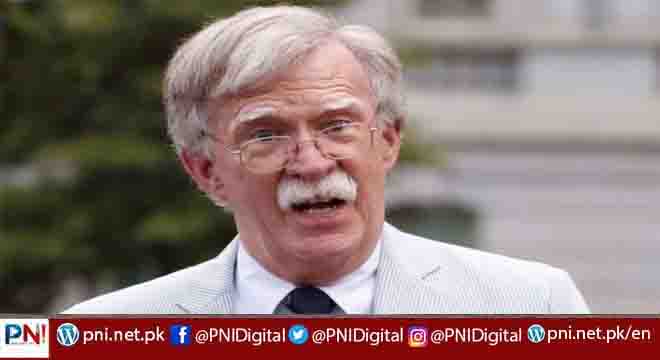ISLAMABAD, Mar 12 (APP):Former U.S. National Security Adviser, John Bolton, on Sunday warned the Biden administration against “sitting still” as China broadens its relationship with Russia and after it brokered a diplomatic breakthrough between Iran and Saudi Arabia that has been welcomed by the United Nations and Middle East countries.
But White House officials have been downplaying China’s involvement in Friday’s development, which surprised many diplomats, saying they believe internal and external pressure, including effective Saudi deterrence against attacks from Iran or its proxies, ultimately brought Tehran to the table.
White House spokesperson John Kirby said on Friday that while Washington was not directly involved, Saudi Arabia kept U.S. officials informed of the talks with Iran.
Relations between the U.S. and China have become highly contentious over issues ranging from trade to espionage and increasingly the two powers compete for influence in parts of the world far from their own borders.
But former senior U.S. and U.N. official Jeffrey Feltman said China’s role, rather than the re-opening of embassies after six years, was the most significant aspect of the agreement.
“This will be interpreted – probably accurately – as a slap at the Biden administration and as evidence that China is the rising power,” said Feltman, a fellow at the Brookings Institution, a Washington-based think-tank.
On Sunday, Bolton, the foreign policy hawk, said in a radio news programme, “We’re sitting still, and the Chinese, the Russians, Iran, North Korea, and several others, are moving to shore up their relations and threaten us in a lot of different places.”
“It’s an indication that the Saudis and others are trying to hedge their bets with China and Russia, because they don’t think the United States has the resolve and the fortitude necessary to do what they need to do to protect the world against Iran and its intentions,” Bolton, who served in the Trump and George W. Bush administrations, said.
“The Chinese have a strategy they’ve been following,” he continued.
“We kind of wander around from day to day.”
Saudi Arabia and Iran have agreed to restore diplomatic relations and reopen their embassies and missions within two months. They have also agreed to hold talks between foreign ministers to arrange ambassadors’ exchanges and explore ways to strengthen bilateral relations, according to a tripartite joint statement between Iran, Saudi Arabia and China in Beijing on Friday.
On behalf of the UN Secretary-General Antonio Guterres, Spokesman Stephane Dujarric welcomed the agreement, stressing that good neighbourly relations between Iran and Saudi Arabia are essential for the stability of the Gulf region.
“The Secretary-General reiterates his readiness to use his good offices to further advance regional dialogue and to ensure durable peace and security in the Gulf region,” said Dujarric at the regular noon briefing on Friday.
Pakistan’s Prime Minister Shehbaz Sharif welcomed the signing of historic agreement, saying in a tweet that China-mediated deal augurs well for peace, stability and economic development in Middle East and Muslim world.
The Pakistani leader also said it shows that with collective wisdom, win-win outcomes are possible.
During his just-concluded visit to the New York, Foreign Minister Bilawal Bhutto Zardari also hailed the accord, saying, “This diplomatic breakthrough will instill confidence and trust and contribute to peace and stability in region, which speaks of the positive leadership of China on the world stage – their attempts to promote unity, win-win cooperation and dispute resolution.”
Noting that the agreement will hopefully enhance security and stability in the Middle East, Lebanese Foreign Minister Abdallah Bou Habib on Friday called on Arabs to engage in an Arab-Iranian dialogue based on respect for the sovereignty of states, non-interference in their internal affairs, and good neighborliness.
“It is hoped that this step will contribute to strengthening the pillars of security and stability in the region and the consolidation of positive and constructive cooperation that will inevitably benefit the countries of the region, their peoples and the world,” Bou Habib was quoted as saying by the Lebanese National News Agency.
Applauding the positive Chinese role that contributed to reaching the agreement, the Palestinian Presidency expressed hope that it would lead to stability and strengthening of the positive atmosphere in the region.
It is hoped that the step will enhance stability and security in the region in a manner based on the preservation of the sovereignty of states and non-interference in their internal affairs, Jordan’s Foreign Ministry said in a statement.
As a country that has hosted several rounds of Saudi-Iran dialogue, Iraq also welcomed the agreement, saying that “a new page of diplomatic relations between the two neighboring countries begins,” according to a statement by the Iraqi Ministry of Foreign Affairs.
On his part, Bolton said, “One of the biggest winners of the war in Ukraine has been China. If Russia were to win, and at the maximum retake all of Ukraine, that would be a victory for China’s ally that would strengthen China as well.”??
China even succeeds in Russian failure, Bolton said.
??But, frankly, if Russia continues to get chewed up in Ukraine, that just makes Russia more dependent on China,” he said.
“So China wins there as well.”
Bolton said that Beijing has managed to flip its relationship with Russia.
“It’s exactly right to say that we’re watching Russia slip increasingly under Chinese control,” he said.
“This is China’s alliance it’s putting together, and Russia is the junior partner.
“That’s not good for any of us,” Bolton added. “I’d like to find ways to pry Russia away from China.”
Follow the PNI Facebook page for the latest news and updates.









